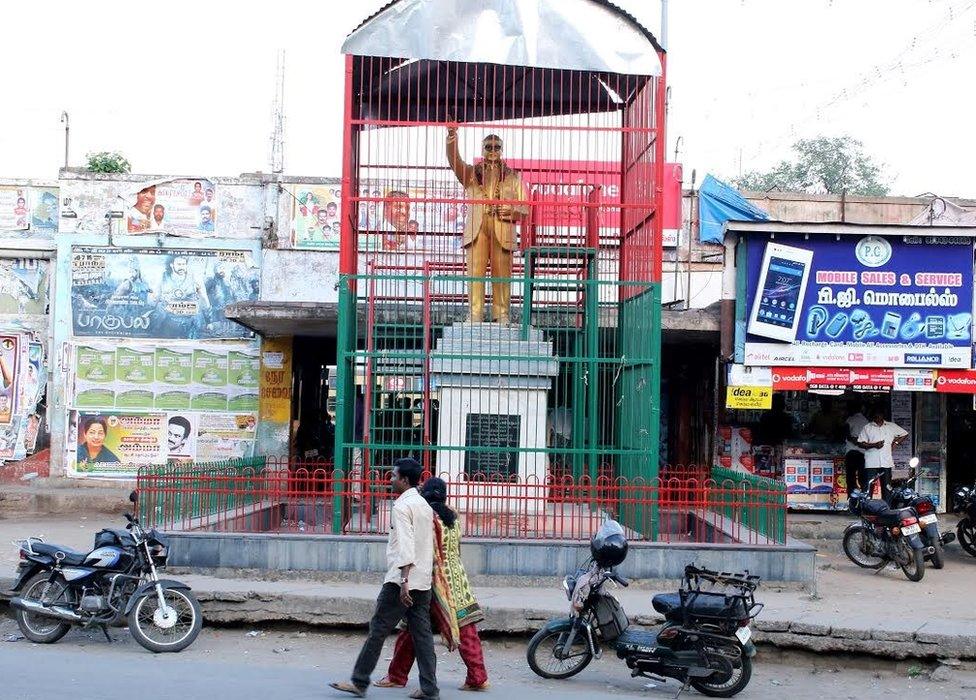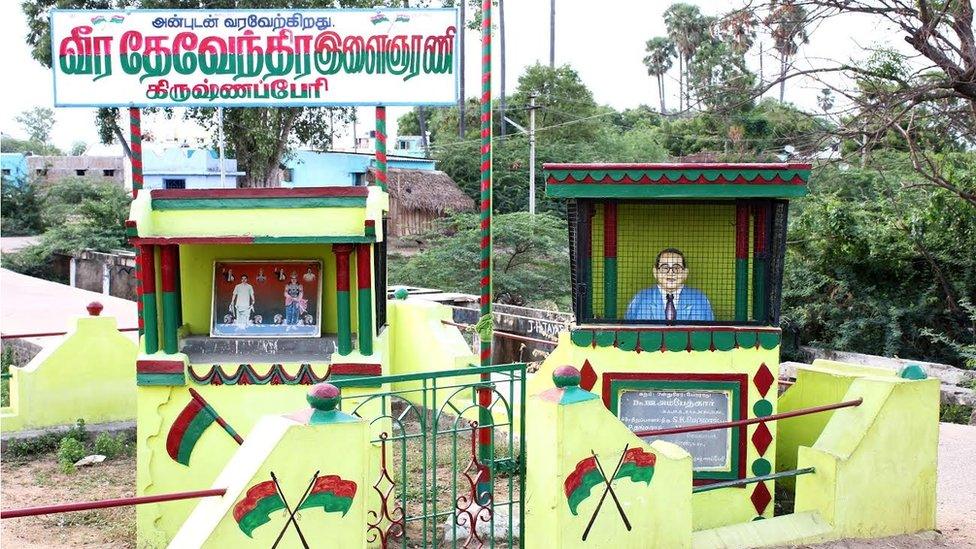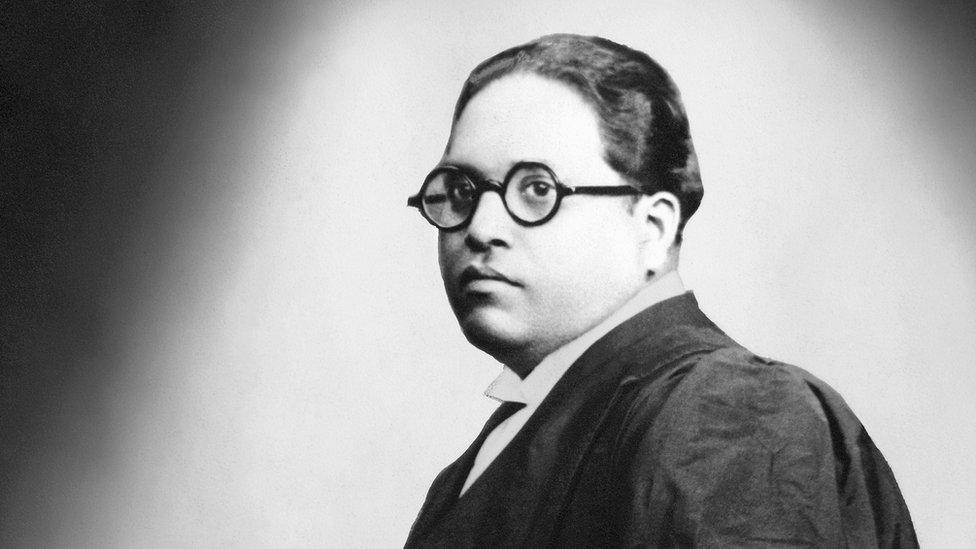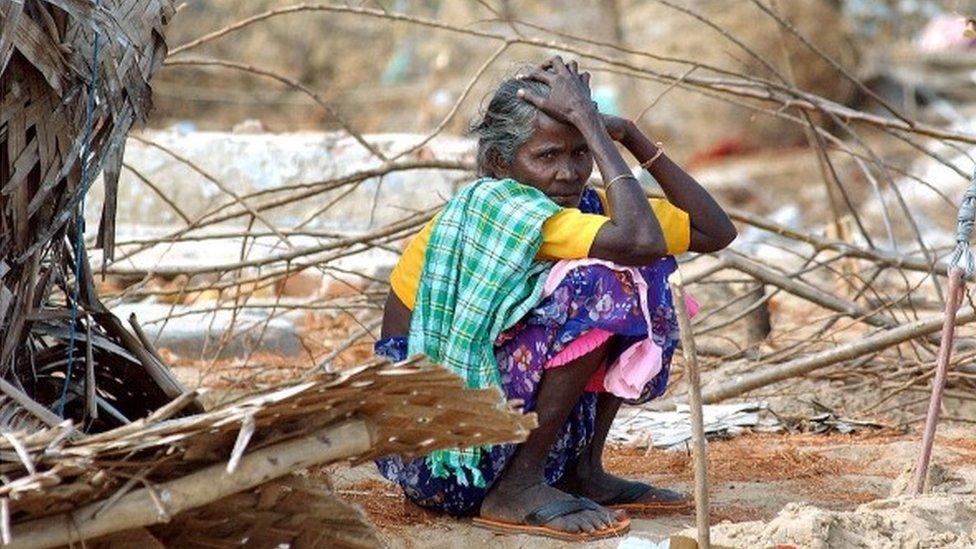Why are statues of Indian icon Ambedkar being caged?
- Published

A caged statue of Ambedkar in Tamil Nadu
He was one of India's tallest leaders: the architect of what is probably the world's longest constitution, a legal scholar, a spiritual leader and, most importantly, the undisputed leader of Dalits, some of the most wretched citizens because of an unforgiving and harsh caste hierarchy that condemns them to the bottom of the heap.
After Mahatma Gandhi - whose birthday falls on Friday - Bhimrao Ramji Ambedkar is indubitably India's most revered leader.
All over the country, his statues abound: in towns and cities and villages, road crossings and railway stations, and in parks. The charismatic leader is usually portrayed as a stocky bespectacled man, wearing a western suit and tie, with a pen in his front pocket and holding a book - the constitution of India - under his arm.
This, according to historian Janaki Nair, "symbolises the self-assertion on the part of Dalits". Not surprisingly, in caste-ridden and unequal India, Ambedkar is a lightning rod for Dalits (formerly known as untouchables) and their opponents.
This also possibly explains why authorities are placing in cages the statues of the leader - the "darling of the dispossessed", as historian Ramachandra Guha calls him - in many states.
Dark reality
Tamil Nadu, one of India's most developed states, is one of the worst affected by the scourge of caste. It is India's second largest economy and, according to the World Bank, well on track to meet the major millennium development goals. The state's two main political parties were founded on rationalism. But this masks a dark reality of decades-old and continuing atrocities by the dominant castes against the Dalits, who comprise 19% of the state's population.
Opponents of Dalit assertiveness have, over the years, provoked rioting and violence by desecrating - garlanding them with slippers, cutting off their heads - statues of Ambedkar. Pusillanimous authorities, unable to rein in the dominant castes have responded by placing the leader's statues in cages all over the state.
"This is Tamil Nadu's biggest shame. It shows the complete failure of the state to protect the Dalits. The state is increasingly succumbing to caste barbarity," says political scientist C Lakshmanan.
The opposition is so fierce and brazen that dominant caste groups have joined hands openly to demand softening of laws that aim at curbing atrocities against the Dalits, external - an example of what Mr Lakshmanan calls "explicit anti-Dalit politics".
In the past, dominant castes have refused to let state-run public transport buses named after Dalit icons to enter their villages, forcing the authorities to remove the name. In many villages, Dalits are still not allowed to use communal wells, enter Hindu temples, and visit barber shops.

Commentators say caging the statues of one of India's most revered leaders is a "matter of shame"

Ambedkar is sometimes described as the "darling of the dispossessed"

Dalits make up nearly 20% of the population of Tamil Nadu
More than 70 Dalits - more than in dirt-poor, caste-ridden, violent Bihar state - were killed in Tamil Nadu last year, external in mob attacks and clashes. There have been more than 15 judicial enquiries into incidents of atrocities against Dalits , externalin the state since 1956, but not a single person has been punished.
"The tension with the dominant castes is increasing by the day. The dominant castes are ranged against the Dalits," says D Ravikumar, former lawmaker and leader of VCK, a strident anti-caste party.
Many in the state call the shameful caging of Ambedkar statues as an example of "caste fascism" in modern-day India. It also proves that the country's caste parties are mostly interested in extracting special privileges and concessions for their communities rather than fighting for justice and rights. So untouchability, in its worst and vilest forms, is alive and well in Tamil Nadu.
In one of his memorable speeches, Ambedkar had wondered how long Indians would continue to deny equality in their social and economic life. "If we continue to deny it for long, we do so only by putting our political democracy in peril."
Then, with what many say was chilling prescience, Ambedkar said that much of the growth of independent India was like "building a castle on a dung heap". He was not entirely off the mark.